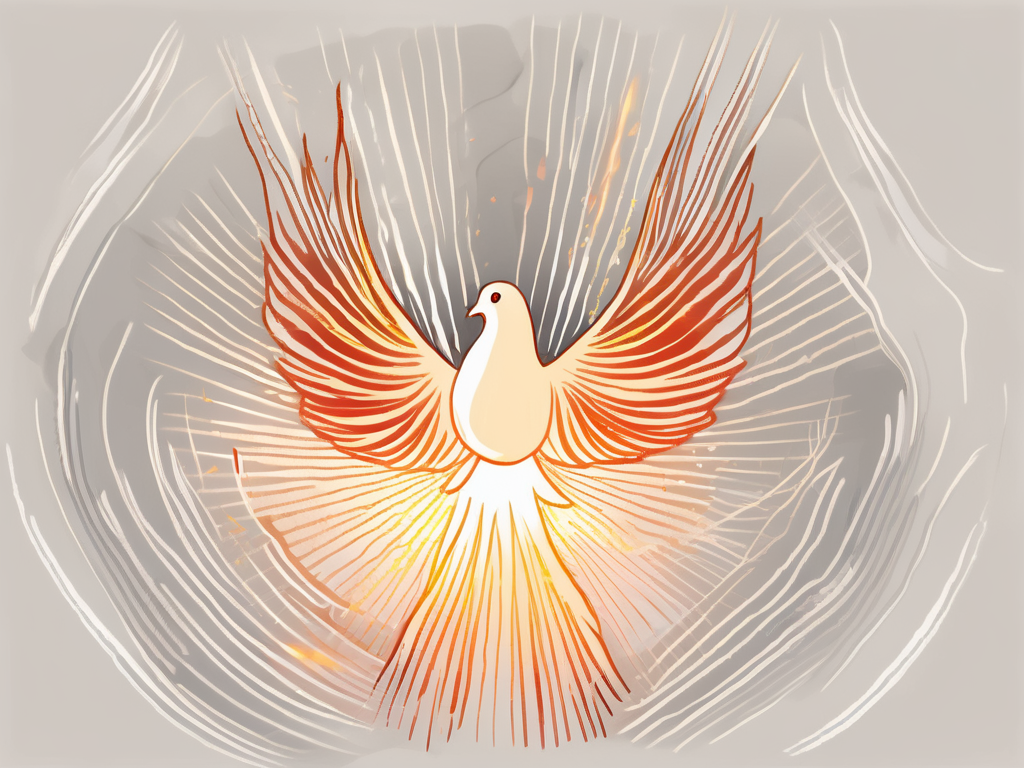The concept of the Trinity is one of the foundational beliefs in Christianity. It teaches that God is one Being who exists in three distinct persons: the Father, the Son (Jesus Christ), and the Holy Spirit. This theological doctrine can be a bit challenging to grasp, but the Bible provides insights into this mysterious aspect of God’s nature. In this article, we will explore what the Bible says about the Trinity and its significance in Christianity.
Understanding the Concept of the Trinity
Before diving into the biblical references to the Trinity, it is essential to grasp the concept and its implications. The Trinity, as mentioned earlier, is the belief that God is one Being in three persons. Each person of the Trinity is fully God, yet distinct in their roles and relationships. It’s a mystery that has perplexed theologians for centuries.
But what does it mean for God to be one Being in three persons? To understand this, we can look at the analogy of a family. In a family, there is one unit, but it consists of multiple individuals – a father, a mother, and a child. Each person in the family has a unique role and relationship with one another, yet they are still one family. Similarly, in the Trinity, God is one Being, but He exists as three distinct persons – the Father, the Son (Jesus Christ), and the Holy Spirit.
Some critics argue that the word “Trinity” does not appear in the Bible, and they are correct. However, the concept is woven throughout the Scriptures, waiting to be discovered through careful examination.
The Trinity in the Old Testament
Although the Old Testament primarily focuses on God the Father, glimpses of the Trinity can be found. In Genesis 1:26, God says, “Let us make mankind in our image, in our likeness.” The plural pronouns “us” and “our” hint at a multi-personal God. This suggests that even in the creation of humanity, there was a divine collaboration between the Father, the Son, and the Holy Spirit.
In Isaiah 48:16, the prophet writes, “From the beginning, I have not spoken in secret; from the time it took place, I was there. And now the Lord GOD has sent me, and His Spirit.” This verse suggests the presence of both the Lord God and His Spirit. Here, we see a glimpse of the Father, the Son, and the Holy Spirit working together in perfect harmony.
The Trinity in the New Testament
The New Testament provides more explicit references to the Trinity. In Matthew 28:19, Jesus commands His disciples to baptize “in the name of the Father and of the Son and of the Holy Spirit.” This verse highlights the three-person nature of God. It is significant because Jesus Himself acknowledges the existence of the Father, the Son, and the Holy Spirit, and instructs His followers to recognize and honor them.
In John 14:16-17, Jesus promises to send the Holy Spirit, whom He calls the “Spirit of truth” and states that the Holy Spirit “dwells with you and will be in you.” Here, Jesus presents Himself, the Father, and the Holy Spirit as distinct persons with active roles. This passage emphasizes the unity and interdependence of the three persons of the Trinity.
As we explore the concept of the Trinity, it is important to remember that our finite minds cannot fully comprehend the infinite nature of God. The Trinity is a divine mystery that invites us to embrace the complexity and wonder of God’s nature. It reveals the depth of His love, the beauty of His unity, and the richness of His relationship with humanity.
Theological Interpretations of the Trinity
Throughout Christian history, theologians have contemplated the nature and roles of each person in the Trinity. This profound mystery has captivated the minds of believers, leading to a rich tapestry of interpretations and understandings.
As we delve into the depths of this theological exploration, let us first examine the three persons of the Trinity: the Father, the Son, and the Holy Spirit. Each person, while distinct, is intricately intertwined in a divine dance of love and unity.
The Father, Son, and Holy Spirit
God the Father, often portrayed as the creator, stands as the eternal source of all things. From the vast expanse of the cosmos to the tiniest particles that make up our existence, His creative power knows no bounds. It is through His divine wisdom and infinite love that the universe came into being.
Jesus, the Son, is the embodiment of God’s love made manifest in human form. In the mystery of the Incarnation, the divine and the human are united in perfect harmony. Through His life, death, and resurrection, Jesus reveals the depth of God’s love for humanity, offering salvation and redemption to all who believe.
The Holy Spirit, often depicted as a dove or tongues of fire, is the divine presence that dwells within believers. It is through the Holy Spirit that God’s power is made known in our lives. Guiding, empowering, and comforting, the Spirit works in tandem with the Father and the Son to bring about transformation and renewal.
The Role of Each Person in the Trinity
While each person in the Trinity has distinct roles, they work in perfect unity, like a symphony of divine harmony. The Father, in His infinite wisdom, sends forth the Son into the world, embodying His love and grace. The Son, in turn, accomplishes the Father’s will, surrendering Himself to the ultimate act of sacrificial love on the cross.
Through the power of the Holy Spirit, the Father’s plan is executed in the lives of believers. The Spirit empowers individuals, guiding them on their spiritual journey and equipping them with the gifts needed to fulfill their unique calling. It is through the interplay of these three persons that the divine plan of salvation is brought to fruition.
As theologians continue to grapple with the complexities of the Trinity, new insights and understandings emerge. The richness of this theological exploration invites believers to dive deeper into the mystery, seeking to comprehend the incomprehensible and to experience the transformative power of the Triune God.
Controversies and Debates Around the Trinity
Throughout history, the Trinity has sparked debates and controversies that have shaped Christian theology. These discussions have delved into the very nature of God and the relationship between the Father, Son, and Holy Spirit.
One of the most significant controversies in the early Church revolved around the nature of Christ in relation to the Father. The Council of Nicaea in AD 325 affirmed that Jesus was of the same substance (homoousios) as the Father, solidifying the Trinitarian doctrine. This declaration was a response to the teachings of Arius, who argued that Jesus was a created being and not equal to the Father. The Council’s decision laid the foundation for the orthodox understanding of the Trinity.
In later centuries, debates arose regarding the procession of the Holy Spirit, resulting in the Great Schism between the Western (Roman Catholic) and Eastern (Eastern Orthodox) churches. The Filioque controversy, which centered around the inclusion of the phrase “and the Son” in the Nicene Creed, became a major point of contention. The Eastern Orthodox Church believed that the Holy Spirit proceeds from the Father alone, while the Western Church added the phrase to emphasize the equality of the Son with the Father. This disagreement, along with other theological and political differences, eventually led to the split between the two branches of Christianity.
Modern Views on the Trinity
In contemporary times, numerous interpretations and understandings of the Trinity have emerged. Some try to simplify or explain the concept using various analogies, like water existing as liquid, ice, and vapor. However, these analogies often fall short in capturing the complexity and mystery of the Trinity.
One modern perspective on the Trinity is the social Trinity, which emphasizes the relational aspect of God’s nature. This view sees the Father, Son, and Holy Spirit as distinct persons who exist in a loving and eternal relationship. Another approach is the psychological Trinity, which suggests that the Trinity is a reflection of human psychology, with the Father representing the conscious mind, the Son representing the ego, and the Holy Spirit representing the unconscious.
Furthermore, feminist theologians have critiqued traditional Trinitarian language for its male-dominated imagery and hierarchical language. They advocate for a more inclusive and egalitarian understanding of the Trinity, highlighting the divine feminine and the importance of relationships based on mutuality and equality.
Overall, the controversies and debates surrounding the Trinity have not only shaped Christian theology but also reflect the ongoing quest to understand the nature of God. As theologians and believers continue to explore this profound mystery, new insights and perspectives will undoubtedly emerge, enriching our understanding of the Trinity and its significance in the Christian faith.
The Trinity in Christian Life and Practice
The belief in the Trinity has profound implications for Christian life and practice. It is a foundational doctrine that shapes the way Christians understand and interact with God, as well as how they live out their faith in the world.
The Trinity, consisting of God the Father, God the Son (Jesus Christ), and God the Holy Spirit, is a complex and mysterious concept that has been the subject of theological contemplation and debate throughout history. While it is impossible for humans to fully comprehend the nature of God, the Trinity provides a framework for understanding the relational aspects of God’s character and how He interacts with His creation.
The Trinity in Worship and Prayer
Christian worship often reflects the Trinitarian nature of God. Prayers are offered addressing each person of the Trinity, acknowledging their distinct yet unified roles in the believer’s life. This practice helps believers recognize and honor the unique attributes and functions of each member of the Trinity.
When Christians pray to God the Father, they express gratitude for His love, provision, and guidance. They acknowledge His role as the Creator and sustainer of all things. Prayers to Jesus Christ, the Son of God, focus on His redemptive work on the cross, His teachings, and His role as the mediator between God and humanity. Prayers to the Holy Spirit seek His guidance, comfort, and empowerment in the believer’s daily life.
Christian hymns and songs also celebrate the Trinity, praising the Father, Son, and Holy Spirit for their unique attributes and works. These songs serve as a means of worship and adoration, expressing the deep reverence and awe that believers have for the Triune God.
The Trinity in Christian Ethics and Morality
Understanding the Trinity helps shape Christian ethics and morality. Just as the persons of the Trinity relate to one another in love and unity, Christians are called to love one another and promote unity among believers. The Trinity serves as a model for how Christians should relate to one another and to the world.
As believers recognize the unity and diversity within the Trinity, they are encouraged to embrace diversity and unity in their relationships with others. This means valuing and respecting the unique qualities and perspectives of individuals, while also seeking to build harmonious and loving relationships.
The Trinity also informs Christian morality by emphasizing the importance of holiness and righteousness. Just as God the Father, Son, and Holy Spirit are holy, Christians are called to live lives that reflect the character of God. This includes striving for moral purity, integrity, and justice in all areas of life.
Furthermore, the Trinity provides a basis for understanding the value and dignity of every human being. Since each person of the Trinity is equally divine and worthy of honor, Christians are called to treat every individual with respect and dignity, regardless of their race, gender, or social status.
In conclusion, the belief in the Trinity has far-reaching implications for Christian life and practice. It shapes the way Christians worship, pray, and relate to one another. It also provides a moral framework that emphasizes love, unity, holiness, and justice. The Trinity is not merely an abstract theological concept, but a living reality that informs and transforms the lives of believers.
Conclusion: The Trinity’s Significance in Christianity
The Trinity stands as a cornerstone of Christian belief and is rooted in the biblical text. Though its exact nature remains elusive, the concept offers a glimpse into the complexity and beauty of God’s nature.
While the Trinity may defy complete human comprehension, it serves as a reminder of the divine mystery that invites believers to explore and appreciate the depths of God’s character. By recognizing and embracing the Trinity, Christians can deepen their understanding of God and live out their faith with a greater sense of awe and reverence.












